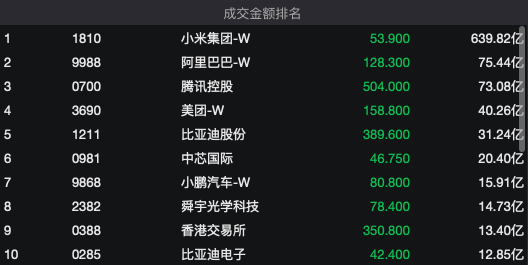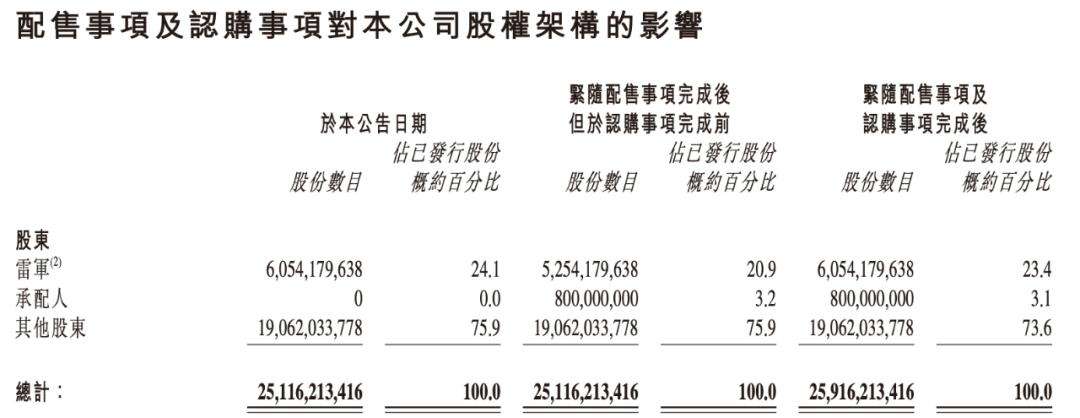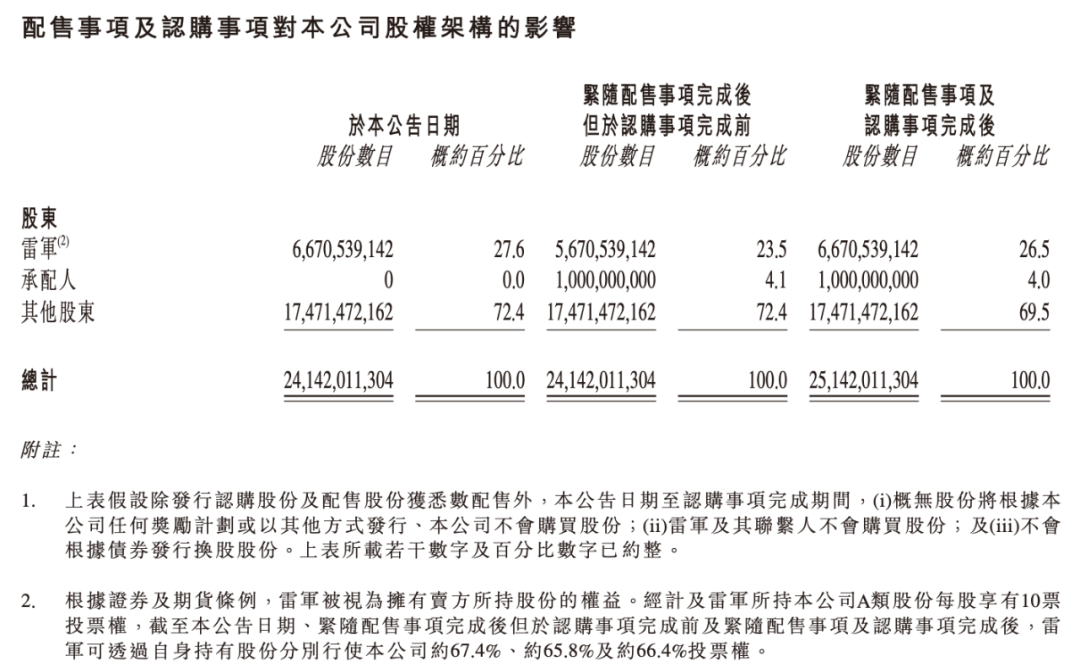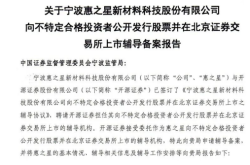Xiaomi Raises HK$42.5 Billion Through Discounted Placement, Morning Trading Volume Soars to Record High
![]() 03/25 2025
03/25 2025
![]() 571
571
On Tuesday, Xiaomi Group announced plans to raise approximately HK$42.5 billion through the placement of 800 million shares. Following the announcement, the company's Hong Kong stocks opened 5.53% lower at HK$53.85, with the intraday decline peaking at 6.58%.
By the morning close, the stock's decline had narrowed to 5.44%, while the morning trading volume surged to nearly HK$64 billion, setting a new record and topping the trading volume of all Hong Kong stocks for the day. Alibaba and Tencent Holdings followed in second and third place, each with trading volumes of around HK$7.5 billion.

Image source: Wind Financial Terminal
The placement price was set at HK$53.25, representing a discount of approximately 6.6% from the previous day's closing price. The placed shares constitute approximately 3.2% of the company's current issued share capital and approximately 1.2% of voting rights, diluting to approximately 3.1% and 1.2%, respectively, after the issuance. The net proceeds from this placement will be allocated towards accelerating business expansion, funding R&D initiatives, and other general corporate purposes.
The placement is anticipated to be completed by March 27 or at a mutually agreed-upon date between the company and the managers.
According to Bloomberg, transaction terms reveal that Xiaomi Group initially sought to place 750 million shares at a price range of HK$52.8 to HK$54.6 per share. This indicates that the actual number of shares placed has increased.
Citi analyst Kyna Wong noted in a research report that given Xiaomi Group's potential to reduce leverage, support AI-related R&D, and expand automobile production capacity, this placement could have long-term positive implications for the company. However, the report also cautioned that the placement would result in shareholding dilution and could exert short-term pressure on the share price.
China Merchants Bank International believes that this funding will positively impact Xiaomi's global expansion strategy for its smartphone, AIoT, and electric vehicle businesses in the long run, offsetting recent concerns about the 3.2% equity dilution. The bank maintained Xiaomi Group's "Buy" rating and target price of HK$59.52, based on the SOTP (Sum of the Parts) method.
Macquarie, an investment bank, published a research report stating that Xiaomi Group's placement is a strategic move aimed at strengthening the company's balance sheet and supporting business development this year by capitalizing on favorable market conditions. According to the bank's prior estimates, Xiaomi Group's cash level in the first half of 2025 is expected to be lower than that at the end of the fourth quarter of last year due to increased capital expenditures, inventory, and accounts receivable.
This placement and subscription will also impact Xiaomi Group's shareholding structure.
As of the announcement date, Lei Jun holds a total of 6.05 billion shares, accounting for 24.1% of the company's issued shares. Upon completion of the placement but before the subscription, Lei Jun's total shareholding will decrease to 5.25 billion shares, representing a 20.9% shareholding ratio. After both the placement and subscription are completed, Lei Jun's total shareholding will revert to 6.05 billion shares, but the shareholding ratio will be diluted to 23.4%.

During these three stages, Lei Jun's voting rights through his shareholding also underwent slight changes, with respective ratios of 64.9%, 63.7%, and 64.1%. Meanwhile, other shareholders' shareholding ratios will decrease from 75.9% to 73.6%, with the newly placed shareholders ultimately holding a 3.1% stake.
This is Xiaomi Group's second share placement to raise funds in over four years and the second large-scale share placement in the Hong Kong stock market since March, following BYD's share placement that raised HK$43.383 billion three weeks ago.
Xiaomi Group's last share placement to raise funds occurred in early December 2020, when the company placed 1 billion shares at HK$23.7 per share, representing approximately 4.1% of the issued share capital and 1.5% of voting rights, diluting to approximately 4% and 1.5%, respectively, post-issuance. The placement price was discounted by approximately 9.4% from the previous trading day, raising a net amount of approximately US$3.1 billion (equivalent to approximately HK$23.7 billion).

At that time, the proceeds from the share placement were primarily used to boost the company's working capital for business expansion, increase market share in key markets, invest in strategic ecosystems, and for other general corporate purposes.
Xiaomi Group's current placement coincides with the company's expansion of its automobile production capacity, increase in annual delivery targets, and scaling up of investments in AI.
According to the original plan, the second phase of the Xiaomi Automobile factory was set to be completed and commence production by the middle of this year, with a designed annual production capacity of 150,000 vehicles. However, since the launch of the company's first vehicle, the Xiaomi SU7, in late March 2024, delivery volumes and locked-in orders have continuously set new company records. Recent news indicates that Xiaomi Group plans to incorporate an adjacent 52-hectare plot into the second phase of the factory to further expand its production capacity.
At the end of February, Lei Jun announced at the SU7 Ultra launch event that Xiaomi Group's R&D investment is expected to reach RMB 30 billion in 2025, with approximately a quarter of the budget allocated to AI and related businesses.
During last week's earnings call, Xiaomi Group's CFO Lin Shiwei predicted that capital expenditures in 2025 will exceed those of 2024, with the primary increase stemming from the automobile and AI businesses.
According to Xiaomi Group's latest financial report, the company's total capital expenditures in 2024 amounted to RMB 10.48 billion, with innovative businesses such as mobile phones × AIoT and smart electric vehicles accounting for 61.25% and 38.75%, respectively.
As of the reporting period's end, the company's total cash and cash equivalents stood at RMB 33.661 billion, a decrease of nearly RMB 6 billion from the end of the third quarter but an increase of RMB 30.129 million year-on-year.



